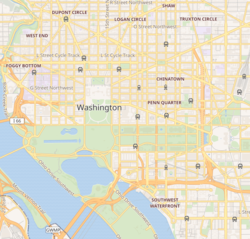
The Marriner S. Eccles Federal Reserve Board Building houses the main offices of the Board of Governors of the United States' Federal Reserve System. It is located at the intersection of 20th Street and Constitution Avenue in Washington, D.C. The building, designed in the Stripped Classicism style, was designed by Paul Philippe Cret and completed in 1937. President Franklin D. Roosevelt dedicated the building on October 20, 1937.

The United States Post Office and Court House is a courthouse of the United States District Court for the Eastern District of Kentucky located in Lexington, Kentucky. Built in 1934, it was listed on the National Register of Historic Places in 1999.

The William R. Cotter Federal Building is a historic post office, courthouse, and federal office building located at 135–149 High Street in Hartford, Connecticut. It was the courthouse for United States District Court for the District of Connecticut until 1963.

The United States Bankruptcy Courthouse, Tallahassee, Florida, is a courthouse of the United States District Court for the Northern District of Florida.

The William Augustus Bootle Federal Building and U.S. Courthouse, also and formerly known as Old U.S. Post Office and Federal Building, is a courthouse in Macon, Georgia of the United States District Court for the Middle District of Georgia. Completed in 1908, it initially served as a courthouse of the United States District Court for the Southern District of Georgia, until the creation of the Middle District in 1926. It was individually listed on the National Register of Historic Places (NRHP) in 1972 as "Old U.S. Post Office and Federal Building", and also is included in the NRHP-listed Macon Historic District. It was renamed in honor of district court judge William Augustus Bootle in 1998.
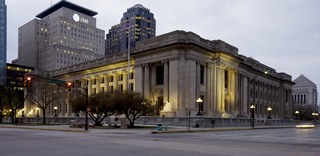
The Birch Bayh Federal Building and U.S. Courthouse, formerly known as the U.S. Courthouse and Post Office and as the Federal Building, is a courthouse of the United States District Court for the Southern District of Indiana, located in Indianapolis. It is a distinguished example of Beaux-Arts architecture, and was listed in the National Register of Historic Places in 1974. Constructed from 1902 to 1905, the United States District Court for the District of Indiana met here until it was subdivided in 1928; the United States Circuit Court for the District of Indiana met here until that court was abolished in 1912. It was listed on the National Register of Historic Places as "U.S. Courthouse and Post Office" in 1974. The courthouse was renamed in honor of Senator Birch Bayh in 2003.

The E. Ross Adair Federal Building and U.S. Courthouse is a historic post office, courthouse, and federal office building located at Fort Wayne in Allen County, Indiana. The building is a courthouse of the United States District Court for the Northern District of Indiana. It was listed on the National Register of Historic Places in 2006 as U.S. Post Office and Courthouse.

The Gene Snyder U.S. Courthouse and Custom House, also known as United States Post Office, Court House and Custom House, is a historic courthouse, custom house, and post office located at Louisville in Jefferson County, Kentucky. It is the courthouse for the United States District Court for the Western District of Kentucky. It is listed on the National Register of Historic Places under the "United States Post Office, Court House and Custom House" name.

The U.S. Custom House, also known as the Old Post Office and Custom House, is a historic government building at 423 Canal Street in New Orleans, Louisiana. It was designated a National Historic Landmark, receiving this designation in 1974 and noted for its Egyptian Revival columns. Construction on the building, designed to house multiple federal offices and store goods, began in 1848 and didn't finish until 1881 due to redesigns and the American Civil War. The U.S. Customs offices have been located there since the late 19th century.

The United States Custom House is a historic custom house at 312 Fore Street in downtown Portland, Maine. It was built from 1867–1872 to house offices of the United States Customs Service, and was listed on the National Register of Historic Places in 1973.

The Federal Building and U.S. Courthouse, Port Huron, Michigan is a historic courthouse and federal office building located at Port Huron in St. Clair County, Michigan. It is a courthouse of the United States District Court for the Eastern District of Michigan.

The Mike Mansfield Federal Building and United States Courthouse is a courthouse of the United States District Court for the District of Montana, located in Butte, Montana. Completed in 1904, the building was expanded from 1932 to 1933.

The Federal Building and U.S. Post Office, Spokane, Washington is a historic post office, courthouse, and custom house building at Spokane in Spokane County, Washington. It is a courthouse for the United States District Court for the Eastern District of Washington.

The Gus J. Solomon United States Courthouse is a federal courthouse located in downtown Portland, Oregon, United States. Completed in 1933, it previously housed the United States District Court for the District of Oregon until the Mark O. Hatfield United States Courthouse opened in 1997. The Renaissance Revival courthouse currently is used by commercial tenants and formerly housed a U.S. Postal Service branch. In 1979, the building was added to the National Register of Historic Places as U.S. Courthouse.
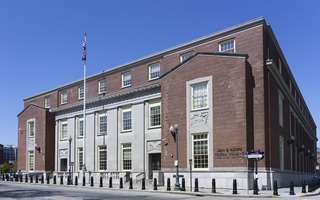
The John O. Pastore Federal Building is a courthouse of the United States District Court for the District of Rhode Island located in Providence, Rhode Island. The building also houses a post office.

The United States Post Office and Courthouse is a courthouse of the United States District Court for the Eastern District of North Carolina, located in New Bern, North Carolina. The building was completed in 1935, and was listed in the National Register of Historic Places in 1973, as a contributing building within the New Bern Historic District, and was individually listed in 2018.

The David W. Dyer Federal Building and U.S. Courthouse, formerly known simply as the U.S. Post Office and Courthouse, is an historic United States Post Office and federal courthouse of the United States District Court for the Southern District of Florida located at 300 Northeast 1st Avenue in Miami, Florida. Built in 1931 of limestone, it is the largest such structure in South Florida.

The Little Rock U.S. Post Office and Courthouse, also known as Old Post Office and Courthouse, in Little Rock, Arkansas, is a historic post office, federal office, and courthouse building located at Little Rock in Pulaski County, Arkansas. It is a courthouse for the United States District Court for the Eastern District of Arkansas.
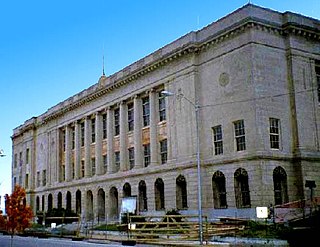
The Ed Edmondson United States Courthouse, previously called the Muskogee Federal Building- United States Courthouse, is a historic government building in Muskogee, Oklahoma. It was built in 1915 as a post office and federal courthouse. Although it is no longer used as a post office, it is currently in use by several government offices, including the U.S. Marshals and U.S. Probation Office as well as the United States District Court for the Eastern District of Oklahoma.
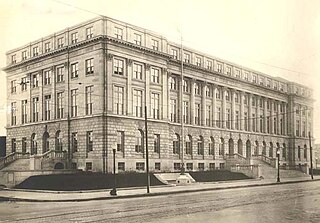
The United States Courthouse, located in Des Moines, Iowa, is the headquarters for the United States District Court for the Southern District of Iowa. It is part of the Civic Center Historic District that was listed on the National Register of Historic Places in 1988.

